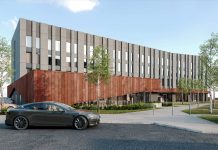Property assets in Birmingham remain on investors’ shopping lists, despite the challenges posed by Covid-19 and the post-Brexit era, according to PwC and the Urban Land Institute’s (ULI) annual Emerging Trends in Real Estate Europe 2021 report.
Birmingham places 18th on the list of European cities based on the local outlook for real estate prospects in rents and capital values, in comparison to the 27th place last year. This improvement demonstrates its resiliency amidst the Covid-19 crisis, which has seen many other cities’ prospects deteriorate more significantly.
The Emerging Trends Europe report finds the real estate sector across the continent is in the midst of a cyclical downturn, which coincides with long-term structural changes fast-forwarded by the pandemic.
However, property is one of the few asset classes able to generate acceptable returns at a time of low or negative interest rates.
Jonathan Clements, real estate tax director at PwC, said:
“The pandemic has accelerated a number of previously identified structural trends, notably the increase in e-commerce and remote working. This has forced investors to re-examine the risk and return on assets.
“It is a challenging time for the real estate industry, with global political change, Brexit and the pandemic creating uncertainty, and understandably a cautious outlook for 2021, but this is balanced by the weight of capital to be deployed.
“The uncertainty of this year has shifted priorities in the sector; we’ve seen a move away from the mainstay sectors of retail, hospitality and leisure, a pause in relation to office, and a strengthening demand for alternative sectors such as housing, data centres, life sciences/health, energy and communications infrastructure and a continued desire for industrial property and logistics warehouses – which all benefit from growing demand in this new environment.
“There’s a growing requirement to look more closely at the value that can be derived from these demand shifts, and newer, emerging asset classes. Investors are therefore looking beyond real estate and into broader real assets – the built environment and infrastructure that surrounds us. These are all inextricably linked, not only to one another, but to how we live, work, consume and spend our leisure time – and we will see these trends play out in the region.”
PwC/ULI’s authoritative report, now in its 18th year, is based on a survey of almost 1,000 property executives from 25 countries around Europe.
The lasting impact of Covid-19 on office working means that the industry values the merits of small and medium-sized cities, provided they are well connected. Respondents overwhelmingly judged transport connectivity as the most important factor in assessing cities.
Adrian Bland, chair, ULI Midlands and head of commercial real estate, Shakespeare Martineau, said:
“At the heart of the country and with £5.1bn being invested in rail, tram and bus rapid transport systems – including HS2, Europe’s largest infrastructure project – Birmingham is wonderfully well-connected. If you factor in the large-scale 5G rollout across Birmingham, Coventry and Wolverhampton and Birmingham`s growing population – the youngest city in Europe – you have a compelling proposition for investors.
“Birmingham`s Our Future City Plan, currently out for consultation, can take all this to yet another level.”
According to Emerging Trends Europe, current investor preferences include logistics, data centres, life sciences and residential property assets.
Martin Guest, ULI Midlands’ board member and managing director of the Birmingham office of CBRE, said:
“Many investors have stockpiled cash during the pandemic and consequently there is a weight of capital waiting to be deployed.
“Birmingham ticks a number of boxes on investors’ wish lists – it has a fast emerging life sciences sector and the private rental sector is maturing. We are seeing intense competition for logistics assets and although the office sector is more challenging given the change in working practices, when stock does come to the market it is quickly snapped up.”





















